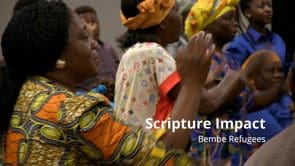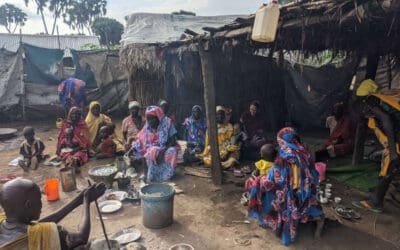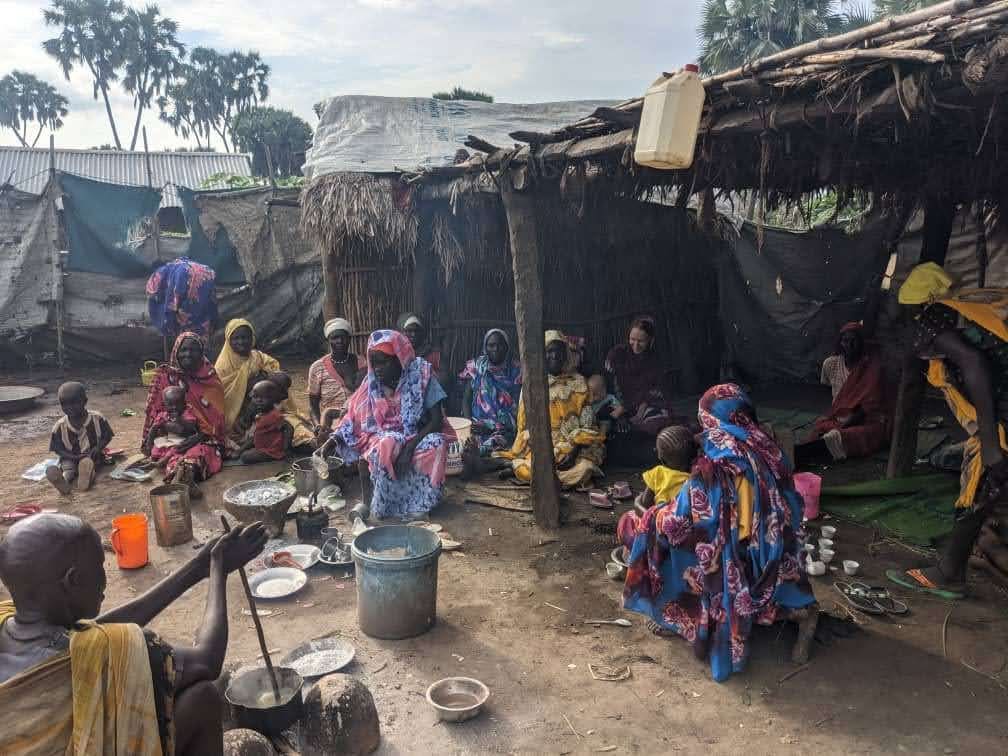It’s not that I haven’t been around dead babies before.
This is a refugee camp in North Africa. Babies die every day. Malaria. Malnutrition. Dysentery. Other generic tragedies that make up the backdrop of a life marked by poverty and war. The story is neither new nor uncommon.
But Amna was different. At least to me. Because unlike the thousands of nameless babies in the refugee camp next to which I have made my home, I knew Amna. Her mother is my friend, her father the lead Bible translator on our team. Unlike the mental image of a refugee baby we all conjure in our minds, she was absurdly fat, the cherished youngest child of six, usually topped with a pink crochet hat despite the heat; she was always being coddled and kissed. At eight months old, she had peed on my lap more than once as I bounced her in the sparse shade of a thorn tree on long Sunday afternoons.
Her illness, like so many others, started with fever and diarrhea; her parents had taken her to the local clinic where she was given some medicine. But the days stretched on and she grew sicker still. By the time she was taken to the hospital in the closest town, there was very little the doctor could do. She died in her mother’s arms around midnight, in the midst of a torrential rainstorm that brought down a baobab tree just outside the hospital walls.
A few women made lewd jokes and laughed caustically ― their community’s balm for death’s sting.
When I sat on the woven mats laid out on cleanly swept dirt with 30 other women at the funeral, I grappled with what to say and how to act. Most women sat quietly with legs stretched out in front of them, some chatting with their neighbors, others just watching the proceedings. A few older women made lewd jokes and laughed caustically, a practice I have learned is a way of mocking death, disempowering this terrible force that stalks even the young. Occasional newcomers entered the compound and broke out in loud wailing, their faces hidden in the crook of their elbows.
Amna’s mother sat near me through all of this. Her eyes dry, her mouth set in a firm line. Her hands rested easily on her empty lap. After graciously receiving my fumbled attempts at heartfelt cross-cultural condolences, she began to speak.
“Eva, my heart was burning in me while she was in the hospital. My baby. I felt so much inside of me as I saw the tubes going in her nose, the needle in her hand. But late that night, as she became tense in my arms and the wind began blowing outside, my heart began to cool. I began to pray. And I told my Amna, ‘It is time for you to go now. You were only meant to be in this world a short time. But now, someone named Jesus is coming for you. He will be here soon. When you see him, go to him. He will take care of you. And we will be together again someday.’”
Tears poured out of me as I listened to Amna’s mother. The loss felt simply unspeakable.
And yet different.
Different than all the other mothers in this part of the world who face this heartbreak. Not just different because this was a baby I knew.
But different because this was a baby buried in Christ.
Worship songs and Scripture reading replaced the usual sacrifices and pagan rituals as Amna’s little body was laid to rest.
After a millennia of traditional religion, and many decades of following a different religion, Amna’s people are coming to know Jesus. Roughly a thousand have been baptized into Christ. Her parents are respected leaders in the church and her father is leading a team to translate the Word of God into her language for the first time in the history of the world. Many of Amna’s people have come to know Jesus.
And at her funeral, rather than the traditional sacrifices and pagan ceremonies that have for so long characterized these events, worship songs were sung over her body. Newly translated scripture was read as she was lowered into the earth. The community of faith rallied around her parents and siblings with love and support, even as a few older relatives lambasted Amna’s parents for their diversion from the old ways.
Following the way of Christ does not guarantee a life free from loss and pain. But it is birthing in these refugees a deeper hope than they have ever known before.
Amna is among the first saints in her community to be welcomed into the Kingdom of Heaven. But she will not be the last. Her life and death mark the beginning — not just of people accepting Jesus into their individual lives, but also of an entire community opening up their shared lives as a community to be transformed by Him.
Following the way of Christ will not always protect these refugees from loss and pain. It didn’t for Amna’s family. It doesn’t for you or me. But it is birthing a deeper hope than they have ever known before. The kind of hope that allows them to whisper to their dying babies, we will be together again. The kind of hope that doesn’t just laugh bitterly in the face of death, but celebrates life, real life, that triumphs over death. The kind of hope that draws people together in deeper transformative community than they have ever experienced.
The kind of hope that cries out to all of us — young and old, living and dying, rich or poor — When you see Jesus, go to Him. He will take care of you.









